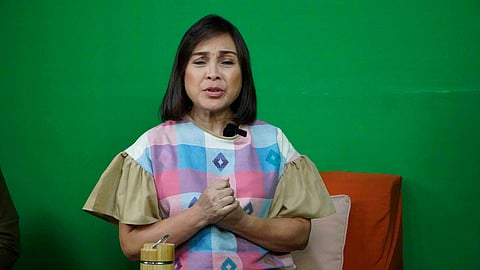
- NEWS
- the EDIT
- COMMENTARY
- BUSINESS
- LIFE
- SHOW
- ACTION
- GLOBAL GOALS
- SNAPS
- DYARYO TIRADA
- MORE

The Magna Carta for Filipino Seafarers, a long-awaited measure, will be signed “sooner than later,” according to Senate President Pro Tempore Loren Legarda.
Despite the contentious issues raised by industry stakeholders, its impending approval will be realized.
“I am one of the authors of the Magna Carta; in fact, when I was the chairman of the foreign relations (committee), I sponsored the concurrence in the ratification of the MLC, or Maritime Labor Convention, and that is a large part of the Magna Carta for Seafarers,” Legarda told DAILY TRIBUNE in a roundtable discussion last Friday.
President Ferdinand Marcos Jr. has delayed signing the proposal that seeks to protect the rights and interests of Filipino seafarers.
Two other bills, Republic Act 11981, the Tatak Pinoy Act, and RA 11982, the amendment of the Centenarian Act, were signed on 26 February.
The Presidential Communications Office said the Magna Carta would undergo further review, which is why Marcos did not sign it.
“I am not sure why it was not signed into law, but I know that in the LEDAC or Legislative Executive Development Advisory Council meeting the other day, where I was one of the senators who attended, it was clarified… and I think it will be signed into law. But I am not sure what the contentious issues are, but it (the Magna Carta) will be important for our seafarers,” Legarda said.
Some contentious provisos
When asked when the President might sign the bill, Legarda said, “I am not the president, but I am sure it will be sooner rather than later.”
Maritime stakeholders, including those who own maritime schools and training centers, oppose Chapter XVIII of the Magna Carta, which requires maritime schools to have their own training ships.
According to Section 84 of the Magna Carta for Filipino Seafarers, under Requirements for Maritime Higher Education Institutions, MHEIs offering Bachelor of Science in Marine Transportation, BS Marine Engineering and other maritime degree programs, as may be approved by Marina (Maritime Industry Authority) in consultation with the CHEd (Commission on Higher Education), “shall be required to have their training ships, simulators or other similar technologies, or shall directly enter into agreements with local or international shipping companies, shipowners, or manning agencies concerning the shipboard training program of their students or cadets.”
Program for Antique students
Earlier this month, Legarda launched the Maritime Education 4.0 Program at the state-owned University of Antique in Sibalom, providing initial funding of P10 million for a Virtual and Augmented Reality simulator and a dedicated Maritime Learning Management System.
Accompanied by her brother, Antique Rep. AA Legarda, she also launched various funded projects, including the local university’s maritime programs, and committed to push in the Senate for more projects in the next years.
The maritime ARVR and LMS project, as part of the broader Maritime Education 4.0 initiative, aims to revolutionize UA Maritime’s curriculum, training methodologies, and infrastructure to prepare students for the challenges of the modern maritime sector geared towards addressing the challenges of the Industrial Revolution 4.0 specifically in the fields of digitalization, automation, robotics and maritime cyber security in the shipping industry.
